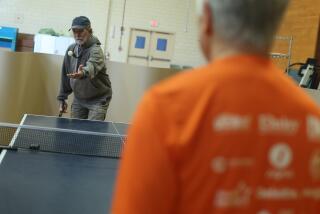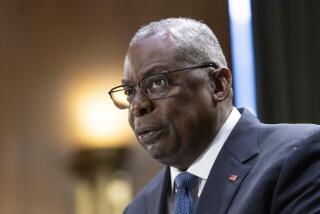Soldiers’ mental health comes under scrutiny
Sgt. Justin “Jon” Garza joined the Army eight years ago at 20. When he arrived at Ft. Hood in June, the communications specialist had deployed six times to Europe and the Middle East, including two bloody stints in Iraq, and was due to return in September. He had broken up with his girlfriend, developed a drinking problem and gone AWOL.
While he was AWOL, Garza threatened to kill himself with a shotgun. Military personnel took him to Ft. Hood’s Darnall Army Medical Center.
Psychiatrists there diagnosed him with an adjustment disorder and depression and sent him home with his best friend, a fellow soldier. He was put on a Monday-through-Friday suicide watch. Eleven days later, on July 11 -- a Saturday -- Garza was found dead of a self-inflicted gunshot to the head.
It was the eighth anniversary of his enlistment.
“I’ve been a wreck and in pain for a long time. I could not take it anymore,” Garza wrote in a suicide note left for his mother. “I was never good at opening up and letting things out, so things just festered and got worse.”
With the shooting rampage at Ft. Hood last week drawing attention to the mental state of America’s troops, the families of soldiers who have returned from combat with significant mental health issues think the public may be ready to listen to their stories.
“My son slipped through the cracks,” said Garza’s mother, Teri Smith, 52.
Army records show that 117 active-duty soldiers have committed suicide so far this year, including 10 at Ft. Hood, the second-highest number of any Army base (Ft. Campbell in Kentucky had 14 soldier suicides). Ft. Hood has had 76 soldier suicides since 2003, according to Army records, but it is also the largest base in the country, home to about 50,000 soldiers.
Two weeks after Garza’s death, Ft. Hood’s commander, Lt. Gen. Rick Lynch, told Congress that he needed more mental health staff.
“That’s the biggest frustration,” Lynch told a House subcommittee. “I’m short about 44 [personnel] of what I am convinced I need at Ft. Hood that I just don’t have.”
In the last six months, Ft. Hood has added suicide prevention classes, and in September opened the Army’s first Resiliency Center Campus, a resort-style building with rock climbing and yoga staffed by psychologists and chaplains. Officials have encouraged soldiers to seek counseling, especially after last week’s shooting.
But Garza’s family and others say the Army must still overcome a culture that discourages showing weakness.
“I asked him one time, ‘Did you see a lot of bad stuff over there?’ ” said Gary Garza, 44, who lives near Ft. Hood and often spent time with his nephew. “He said, ‘Uncle, we just drink a lot not to think about it.’ ”
In February, Jon Garza told his uncle that one of his fellow soldiers had sent him a text message in the middle of the night saying, “If you want to come to my funeral, this is my mom’s phone number.” He told his uncle that by morning, his friend had committed suicide.
The following month, the Army sent Garza to Ft. Gordon in Augusta, Ga., for training. In May, he crashed his car in what friends and family now consider a failed suicide attempt. He went AWOL in June, buying a shotgun and heading back to Ft. Hood.
Garza was soon caught, and he was checked into a civilian hospital until there was an opening at the base facility.
“He said this military hospital didn’t do nothing for me,” said Gary Garza, who visited his nephew at Darnall. Only after his death did Jon Garza’s mother learn that his best friend had talked him out of suicide several times but did not report him to commanding officers. On her son’s laptop, she found suicide notes written in May.
Smith, who runs a federal contract management business out of her apartment in Laurel, Md., said she never suspected her son was suicidal, and no one from the Army told her he was struggling.
“The Army needs to step up,” Smith said. “These kids are coming back, and they’re young and they don’t know how to deal with it. The soldiers that are helping each other need to not be afraid. They need to know if you want to help them, you can’t be afraid to call someone and say, ‘This kid is suicidal, come get him.’ ”
Officials at Ft. Hood and Darnall Medical Center familiar with Garza’s death declined to comment specifically about his case.
“The command is taking a strong, hard look across the formation to help identify any potential problems” with soldiers’ mental health, said Tyler Broadway, a Ft. Hood spokesman.
In August, Defense Department leaders created a suicide prevention task force expected to make recommendations within a year. One of the co-chairs is Bonnie Carroll, executive director of the Washington-based Tragedy Assistance Program for Survivors, which supports relatives of service members who have died, including 500 families of soldiers who committed suicide. The group has a two-person office at Ft. Hood, where commanders in August invited families to address troops about suicide awareness.
“It will be almost a cultural shift to remove the stigma of seeking help,” Carroll said. “Why do people join the military? Because they want to be part of a team and have purpose. They don’t want to be a weak link.”
--
molly.hennessy-fiske@ latimes.com
More to Read
Sign up for Essential California
The most important California stories and recommendations in your inbox every morning.
You may occasionally receive promotional content from the Los Angeles Times.











